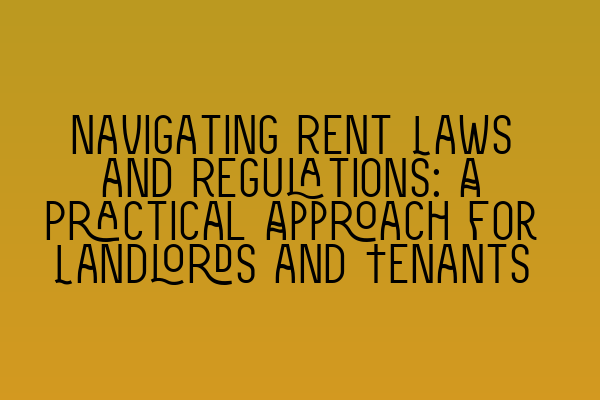Navigating Rent Laws and Regulations: A Practical Approach for Landlords and Tenants
Rent laws and regulations can be complex and challenging for both landlords and tenants to navigate. With various legal requirements, it’s essential to stay up-to-date and understand the rights and responsibilities as a landlord or a tenant. This blog post aims to provide a comprehensive guide on how to navigate rent laws and regulations in a practical and efficient manner.
1. Know the Basics:
Before delving into the complexities of rent laws and regulations, it’s crucial to have a good grasp of the basics. As a landlord or tenant, understanding the key terms and concepts such as tenancy agreements, rent arrears, eviction notices, and repairs is essential. Familiarize yourself with these fundamental aspects to ensure a solid foundation for navigating the intricacies of rent laws and regulations.
2. Research Local Laws:
Rent laws and regulations vary from one jurisdiction to another. It’s important to research and familiarize yourself with the specific laws and regulations in your local area. This will help you understand the legal framework within which you are operating and ensure compliance with regional requirements. Additionally, consider seeking professional advice from a property lawyer who specializes in your jurisdiction to gain a deeper understanding of the legal landscape.
3. Tenant Screening:
For landlords, tenant screening is a critical step in ensuring a smooth and successful tenancy. Conduct thorough background checks, including credit checks, references, and employment verification, to assess the suitability of potential tenants. Following a comprehensive tenant screening process can help minimize the risk of renting to unreliable or problematic tenants, ultimately reducing potential legal issues down the line.
4. Clear and Comprehensive Tenancy Agreements:
One of the most crucial aspects of renting a property is having a clear and comprehensive tenancy agreement in place. This legal document outlines the rights and responsibilities of both landlords and tenants. Ensure that your tenancy agreement includes essential clauses such as rent payment terms, maintenance responsibilities, and rules regarding deposits. By having a well-drafted tenancy agreement, you can establish a framework that protects the interests of both parties and sets clear expectations from the beginning.
5. Rent Increases:
Landlords and tenants need to understand the rules and regulations surrounding rent increases. Rent control policies may cap the amount by which landlords can increase rent annually or during a specific period. Familiarize yourself with the relevant laws in your area to ensure compliance and avoid potential disputes. It’s advisable for landlords to provide written notice to tenants regarding any proposed rent increase, allowing tenants time to adjust their budgets accordingly.
6. Maintenance and Repairs:
Proper property maintenance and prompt repairs are crucial for both landlords and tenants. Landlords have a responsibility to ensure that the property is safe, habitable, and in good repair. Tenants, on the other hand, are expected to report any maintenance issues promptly. Understanding the legal obligations and ensuring open communication between landlords and tenants can help foster a positive rental experience and minimize potential conflicts.
7. Dealing with Rent Arrears:
Rent arrears can be a challenging issue for both landlords and tenants. As a tenant, it’s crucial to prioritize rent payment to maintain a good relationship with the landlord and protect yourself from the risk of eviction. Landlords should have a clear policy in place to address rent arrears, including appropriate notices and legal recourse if required. In case of rent arrears, communication is key. both parties should strive to find a reasonable and mutually beneficial resolution.
8. Seek Professional Advice:
When in doubt or facing complex legal situations, it’s always advisable to seek professional advice from a property lawyer. A property lawyer specialized in rent laws and regulations can provide valuable guidance tailored to your specific situation. They can help you understand your rights, responsibilities, and navigate any legal challenges that may arise during your tenancy.
In conclusion, navigating rent laws and regulations can be a complex task for landlords and tenants. By familiarizing yourself with the basics, researching local laws, carrying out thorough tenant screening, drafting clear tenancy agreements, understanding rent increase rules, prioritizing maintenance and repairs, addressing rent arrears, and seeking professional advice when needed, you can approach the rental process with confidence and minimize potential legal issues.
Remember, staying informed and proactive is key to maintaining a healthy and harmonious landlord-tenant relationship. By incorporating these practical approaches into your rental journey, you can ensure a smooth and compliant experience for all parties involved.
Related Articles:
– SQE 1 Practice Exam Questions
– SQE 1 Practice Mocks FLK1 FLK2
– SQE 2 Preparation Courses
– SQE 1 Preparation Courses
– SRA SQE Exam Dates
